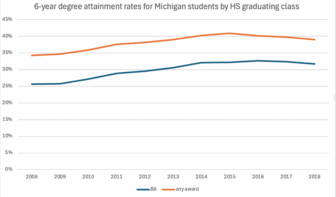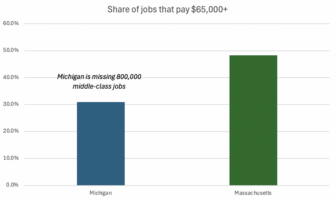A central theme of our work is that the most prosperous places are big metros with a vibrant central city. Defined by a high proportion of adults with a four-year degree or more living in the central city. In many of the most prosperous regions the central city has a higher college attainment rate than the suburbs.
Another theme of ours is that, because talent is the asset that matters most and is in the shortest supply, increasingly employers are moving to where the talent is rather than talent moving to where the jobs are.
In Michigan both are contrary to convention wisdom. As we continue to be dominated by a 20th Century vision of what economic success looks like. (As we explored in a previous post.) Michiganders–including most political and business leaders–seems to believe that its the suburbs and small town/rural areas that are the economic engines and central cities are where the poor concentrate. And that people, by and large, move to where the jobs are.
Today’s reality is far different. More evidence comes from a terrific Wall Street Journal article entitled “Companies say goodbye to the ‘burbs”. The article starts with a chart on the big shift in where the generations are living. With 38% of the Millennials living in a central city, compared to 31% of Generation X and 24% of the Boomers. And then explores the increasing movement of employers to where young talent is: moving from the suburbs to the cities.
The Journal reports: Motorola will join United Continental Holdings Inc., Hillshire Brands Co. HSH—the successor to Sara Lee Corp.— and other corporate giants abandoning vast suburban campuses for urban offices nearer to the young, educated and hyper-connected workers who will lead their businesses into the digital age. Archer Daniels Midland Co. recently said it would move its headquarters from Decatur, Ill., and in the Bay Area, startups like Pinterest Inc. are departing Silicon Valley for San Francisco. After decades of big businesses leaving the city for the suburbs, U.S. firms have begun a new era of corporate urbanism. Nearly 200 Fortune 500 companies are currently headquartered in the top 50 cities. Many others are staying put in the suburbs but opening high-profile satellite offices in nearby cities, …
As we explored previously, whether its established companies like Motorola or technology based start ups like Pinterest, this is the kind of investment that is central to every state’s economic development strategy. These are the investments everyone wants. Turns out to get them you need central cities that are attractive places for mobile talent to live and work. Not exactly the current Michigan economic policy priority. The sooner we learn this new reality the better off we will be.
Michigan needs Detroit, primarily, to be a talent magnet. The Detroit suburbs need Detroit to be a talent magnet. If it isn’t, residents of the Detroit suburbs and Michiganders will be less prosperous. Detroit’s (and to a lesser degree Grand Rapids’ and Lansing’s) success is in the best interest of all of us. That will require a change in state and regional policy. Moving towards public investments in our cities rather than the disinvestment of the last decade or more, a preference for higher rather than lower density development, and for a transportation policy where transit is at least as a high a priority as roads. (See my previous post on urban policy for more details.)






